Difference between revisions of "Anse Park"
(Created page with 'Anse Park is with a length of 120 steps the shortest and the only beach on the southeast side on the island. At first sight, the scenery surrounding Anse Park resembles the coast…') |
Beachmaster (talk | contribs) |
||
| Line 1: | Line 1: | ||
Anse Park is with a length of 120 steps the shortest and the only beach on the southeast side on the island. At first sight, the scenery surrounding Anse Park resembles the coastal area of a windswept British isle where one might expect to find a herd of sheep grazing the hillside. Many coral stones and black granite stones may make swimming difficult at low tide. However, at high tide Anse Park is an excellent snorkelling ground with plenty of marine life to be discovered. On land, violet blooming Beach Morning Glories fight their way through the coarse-grained sand towards the water. An impressive Fish Poison Tree (Barringtonia asiatica) with leaves up to 40 cm long and large white feathery flowers can be found along the coast. Anse Park is the only beach with fresh water nearby. The first inhabitants of the island settled here and built a stone wall around the spring to protect their source of water. Nowadays the second largest group in the Seychelles of about 180 wild breeding tortoises has made these backwaters their home. The native Killifish has been re-introduced to the area by the islands environment manager Steve Hill in an effort to conserve this originally endemic Seychelles specie. | Anse Park is with a length of 120 steps the shortest and the only beach on the southeast side on the island. At first sight, the scenery surrounding Anse Park resembles the coastal area of a windswept British isle where one might expect to find a herd of sheep grazing the hillside. Many coral stones and black granite stones may make swimming difficult at low tide. However, at high tide Anse Park is an excellent snorkelling ground with plenty of marine life to be discovered. On land, violet blooming Beach Morning Glories fight their way through the coarse-grained sand towards the water. An impressive Fish Poison Tree (Barringtonia asiatica) with leaves up to 40 cm long and large white feathery flowers can be found along the coast. Anse Park is the only beach with fresh water nearby. The first inhabitants of the island settled here and built a stone wall around the spring to protect their source of water. Nowadays the second largest group in the Seychelles of about 180 wild breeding tortoises has made these backwaters their home. The native Killifish has been re-introduced to the area by the islands environment manager Steve Hill in an effort to conserve this originally endemic Seychelles specie. | ||
| + | |||
| + | {| class="imageTable" | ||
| + | |- | ||
| + | |colspan="3" | [[File:Anse Park Fregate 001.jpg|600px]] | ||
| + | |- | ||
| + | |[[File:Anse Park Fregate 002.jpg|196px]] | ||
| + | |align="center"|[[File:Anse Park Fregate 003.jpg|196px]] | ||
| + | |align="right"|[[File:Anse Park Fregate 004.jpg|196px]] | ||
| + | |- | ||
| + | |[[File:Anse Park Fregate 005.jpg|196px]] | ||
| + | |align="center"|[[File:Anse Park Fregate 006.jpg|196px]] | ||
| + | |align="right"|[[File:Anse Park Fregate 007.jpg|196px]] | ||
| + | |- | ||
| + | |[[File:Anse Park Fregate 008.jpg|196px]] | ||
| + | |align="center"|[[File:Anse Park Fregate 009.jpg|196px]] | ||
| + | |align="right"|[[File:Anse Park Fregate 010.jpg|196px]] | ||
| + | |- | ||
| + | |colspan="3" | [[File:Anse Park Fregate 011.jpg|600px]] | ||
| + | |- | ||
| + | |colspan="3" | [[File:Anse Park Fregate 012.jpg|600px]] | ||
| + | |- | ||
| + | |} | ||
Latest revision as of 20:43, 7 May 2011
Anse Park is with a length of 120 steps the shortest and the only beach on the southeast side on the island. At first sight, the scenery surrounding Anse Park resembles the coastal area of a windswept British isle where one might expect to find a herd of sheep grazing the hillside. Many coral stones and black granite stones may make swimming difficult at low tide. However, at high tide Anse Park is an excellent snorkelling ground with plenty of marine life to be discovered. On land, violet blooming Beach Morning Glories fight their way through the coarse-grained sand towards the water. An impressive Fish Poison Tree (Barringtonia asiatica) with leaves up to 40 cm long and large white feathery flowers can be found along the coast. Anse Park is the only beach with fresh water nearby. The first inhabitants of the island settled here and built a stone wall around the spring to protect their source of water. Nowadays the second largest group in the Seychelles of about 180 wild breeding tortoises has made these backwaters their home. The native Killifish has been re-introduced to the area by the islands environment manager Steve Hill in an effort to conserve this originally endemic Seychelles specie.
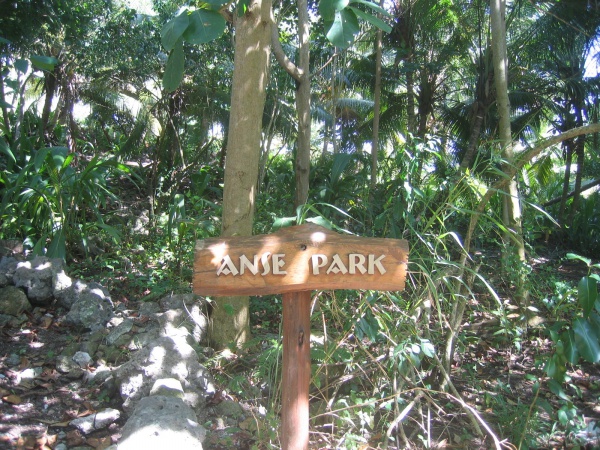
| ||
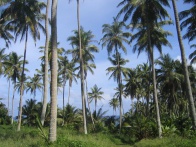
|
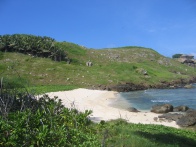
|
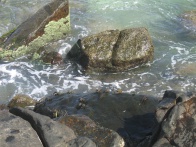
|
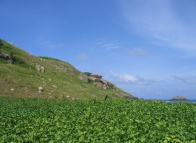
|
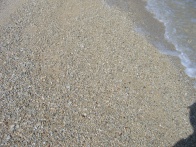
|

|
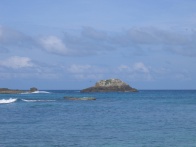
|
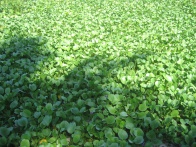
|
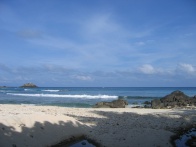
|

| ||
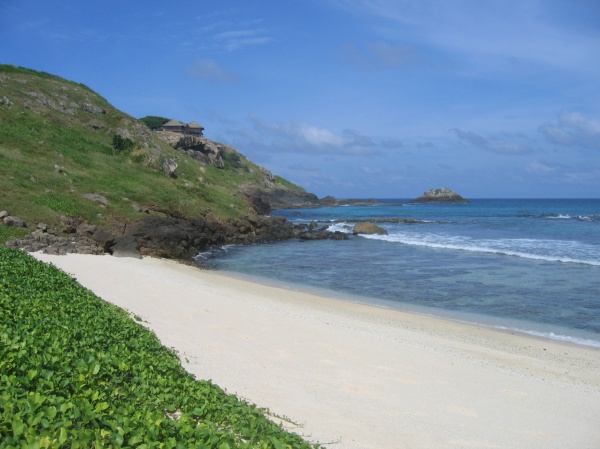
| ||